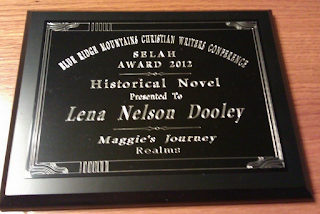But sometimes, it's nice to have your work be recognized by others as being good. That happened to me in May. Maggie's Journey, that released in October 2011, received the Selah Award for historical fiction at the Blue Ridge Mountain Christian Writers Conference. Thank you, judges, for the honor.
And today, a reviewer's site in Australia is featuring Maggie's Journey. You can read it here:
Anne Payne, a reviewer here in the US, had Maggie's Journey on her list of Top Books of 2011.
If you missed Maggie's Journey, here's a sample of the book:
September 1885
Margaret Lenora Caine sat in the library of their mansion on
Beacon Hill . Because of the view of Puget Sound which she loved, she had the brocade
draperies pulled back to let the early September sunshine bathe the room with
warmth. Basking in the bright light, she concentrated on the sketch pad
balanced on her lap. After leaning back to get the full effect of the drawing,
she reached a finger to smudge the shadows between the folds of the skirt. With
a neckline that revealed the shoulders, but still maintained complete modesty,
this dress was her best design so far. One she planned to have Mrs. Murdock
create in that dreamy, shimmery green material that came in the last shipment
from China .
Maggie knew silk was usually a summer fabric, but with it woven into a heavier
brocade satin, it would be just right for her eighteenth birthday party. And
with a few changes to the design, she could have another dress created as well.
Once again, she leaned forward and drew a furbelow around
the hem, shading it carefully to show depth. The added weight of the extra
fabric would help the skirt maintain its shape, providing a pleasing silhouette
at any ball. She pictured herself wearing the beautiful green dress, whirling
in the arms of her partner, whoever he was. Maybe someone like Charles Stanton,
since she’d admired him for several years, and he was so handsome.
“Margaret, what are you doing?”
The harsh question broke Maggie’s concentration. The
charcoal in her hand slipped, slashing an ugly smear across the sketch. She glanced
at her mother standing in the doorway, her arms crossed over her bosom. Maggie
heaved a sigh loud enough to reach the entrance, and her mother’s eyebrows
arched so quickly Maggie wanted to laugh … almost, but she didn’t dare add to
whatever was bothering Mother now. Her stomach began to churn, a thoroughly
uncomfortable sensation. Lately, everything she did put Mother in a bad mood.
She searched her mind for whatever could have set her off this time. She came
up with nothing, so she pasted a smile across her face.
“I’m sketching.” She tried for a firm tone but wasn’t sure
it came across that way.
“You don’t have time for that right now.” Florence Caine
hurried across the Persian wool carpet and stared down at her. “We have too
much to do before your party.”
Of course her mother was right, but Maggie thought she could
take a few minutes to get the new design on paper while it was fresh in her
mind. She glanced toward the mantel clock. Oh, no. Her few minutes had turned into over two hours. She’d
lost herself in drawing designs again. No wonder Mother was exasperated.
She jumped up from the burgundy wingback chair. “I didn’t
realize it was so late. I’m sorry, Mother.”
Florence Caine took the sketch pad from her hand and studied
the drawing with a critical eye. “That’s a different design.”
Maggie couldn’t tell if she liked the dress or not, but it
didn’t matter. Designing was in Maggie’s blood. Her grandmother was a
dressmaker who came up with her own designs instead of using those in Godey’s
Lady’s Book or Harper’s Bazar. And, according to Mother’s sister,
she never even looked at a Butterick pattern. Aunt Georgia had told her often enough
about all the society women who wouldn’t let anyone but Agatha Carter make
their clothing. They knew they wouldn’t be meeting anyone else wearing the
exact same thing when they attended social events in Little Rock , Arkansas
With the news about people being able to converse across
long distances with something called the telephone, someday she might talk to
her that way. But Maggie wanted a face-to-face meeting. Knowing another dress
designer would keep her from feeling like such a misfit. Mother kept reminding
her that she didn’t really fit the mold of a young woman of their social
standing in Seattle .
At least, Daddy let her do what she wanted to. She didn’t know what she’d do
without him to offset Mother’s insistence, which was becoming more and more
harsh.
According to Aunt Georgia , the business Grandmother
Carter started was still going strong, even though her grandmother had to be
over sixty years old. Maggie planned to go visit her relatives in Arkansas , so she could
tour the company. She hoped her journey would happen before she was too late to
actually meet Agatha Carter. Her deepest desire was to follow in her
grandmother’s footsteps, since she had inherited her talents.
The sound of ripping tore through her thoughts. Aghast, she
turned to catch her mother decimating her sketch. She lunged toward the paper,
trying to save it, but Mother held the sketch just out of her reach.
“What are you doing?” Tears clogged her throat, but she
struggled to hide them.
Dribbling the tiny pieces into the ornate wastepaper basket
beside the mahogany desk, her mother looked up at her. “Just throwing it away.
You had already ruined it anyway.”
Anger sliced through Maggie’s heart, leaving a jagged trail
of pain. She still wanted to keep the sketch. She could use it while she
created another. Her plan was to ask her father to help her surprise Mother.
The design would set off her mother’s tall stature and still youthful figure.
She planned to ask him for a length of the special blue satin brocade that
would bring out the color of Mother’s eyes. The dress would make Mother the
envy of most of her friends when the winter social season started in a couple
of months. Now she’d have to begin the drawing all over again. So many hours of
work and her dreams torn to shreds.
“Darling.” That syrupy tone Mother used when she was trying
to make a point grated on Maggie’s nerves. “When are you going to grow up and
forget about your little pictures of dresses?”
Little pictures of dresses? The words almost shredded
the rest of Maggie’s control. She gripped her hands into fists and twisted them
inside the folds of her full skirt.
They’d had this discussion too many times already. She
gritted her teeth, but it didn’t help. In a few days she would be eighteen, old
enough to make decisions for herself. Whether her mother agreed or not.
She stood as tall as her tiny frame would allow her. “Those
aren’t just ‘little drawings,’ Mother. I am going to be a dress
designer.”
The icy disdain shooting from her mother’s eyes made Maggie
cringe inside, but she stood her ground.
“Margaret Lenora Caine, I am tired of these conversations.
You will not become a working girl.” Mother huffed out a very unladylike
deep breath. “You don’t need to. Your father has worked hard to provide a very
good living for the three of us. I will not listen to any more of this
nonsense.”
--Lena Nelson Dooley
--Lena Nelson Dooley






